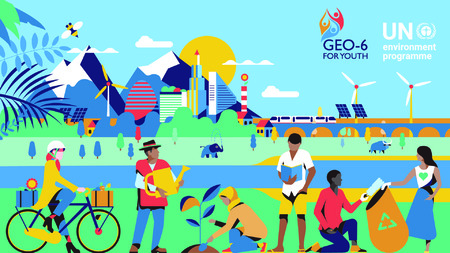GEO-6 for Youth
| dc.contributor | Science Division | en_US |
| dc.contributor.author | United Nations Environment Programme | en_US |
| dc.contributor.other | Al-Kharusi, Maryam | en_US |
| dc.contributor.other | Al-Khatlan, Alanoud | en_US |
| dc.contributor.other | Almutairi, Nawaf | en_US |
| dc.contributor.other | Bhargava, Rohan | en_US |
| dc.contributor.other | Gul, Mohsen | en_US |
| dc.contributor.other | Iraola, Maria Jesus | en_US |
| dc.contributor.other | Jain, Akshay | en_US |
| dc.contributor.other | Khalifa, Muhammad | en_US |
| dc.contributor.other | Masood, Tooba | en_US |
| dc.contributor.other | Mbatu, Richard | en_US |
| dc.contributor.other | Napolitano, Jacopo | en_US |
| dc.contributor.other | Neo, Mei Lin | en_US |
| dc.contributor.other | Nikkam, Jaee | en_US |
| dc.contributor.other | Nyawira, Sarah | en_US |
| dc.contributor.other | Patel, Amit | en_US |
| dc.contributor.other | Patel, Priti | en_US |
| dc.contributor.other | Ravindranath, Darshini | en_US |
| dc.contributor.other | Ryu, Hyeonju | en_US |
| dc.contributor.other | Sitati, Asha | en_US |
| dc.contributor.other | Takeda, Tomoko | en_US |
| dc.contributor.other | van den Ende, Mandy | en_US |
| dc.contributor.other | Viccaro, Mauro | en_US |
| dc.contributor.other | Villegas, Samanta E. | en_US |
| dc.contributor.other | Vo, Hung | en_US |
| dc.contributor.other | Zamani, Leila | en_US |
| dc.contributor.other | Zambrano, Maria Jose | en_US |
| dc.contributor.other | Zastavniouk, Carol | en_US |
| dc.date.accessioned | 2021-02-19T06:40:08Z | |
| dc.date.available | 2021-02-19T06:40:08Z | |
| dc.date.issued | 2021 | |
| dc.identifier.isbn | 978-92-807-3781-3 | en_US |
| dc.identifier.other | DEW/2279/NA | en_US |
| dc.identifier.uri | https://wedocs.unep.org/20.500.11822/35138 | |
| dc.description | GEO-6 states that unless we radically and urgently change our economies and our societies, we will not be able to achieve the United Nations Sustainable Development Goals by 2030.One of the greatest challenges facing young people. today is that we live on a planet with limited resources. Such radical change needs to include everyone and all organizations at every level regardless of age, disability, gender/sexual orientation, religion, or level of governance or business. During their lifetime young people, in particular, will face the environmental consequences of actions taken or not taken today. Their active engagement in understanding the state of our environment (and the importance of protecting it) is critical if we are to achieve sustainable development globally. Young people need a strong voice and must play a key role in achieving environmental sustainability. The GEO-6 for Youth report provides them with a platform: this report is both a guide for action and a manifesto on how to achieve sustainability within a generation. | en_US |
| dc.format | Text | en_US |
| dc.language | English | en_US |
| dc.rights | Public | en_US |
| dc.subject | sustainable development | en_US |
| dc.subject | nature conservation | en_US |
| dc.subject | employment | en_US |
| dc.subject | sustainable consumption | en_US |
| dc.subject | economic development | en_US |
| dc.subject | population growth | en_US |
| dc.subject | climate change | en_US |
| dc.subject | urbanization | en_US |
| dc.subject | air pollution | en_US |
| dc.subject | water pollution | en_US |
| dc.subject | marine pollution | en_US |
| dc.subject | marine debris | en_US |
| dc.subject | microbead | en_US |
| dc.subject | Anthropocene | en_US |
| dc.subject | land | en_US |
| dc.subject | biodiversity | en_US |
| dc.subject | freshwater | en_US |
| dc.subject | ocean | en_US |
| dc.subject | circular economy | en_US |
| dc.subject | education | en_US |
| dc.subject | energy efficiency | en_US |
| dc.title | GEO-6 for Youth | en_US |
| dc.type | Publications | en_US |
| dc.type | Technical Reports | en_US |



